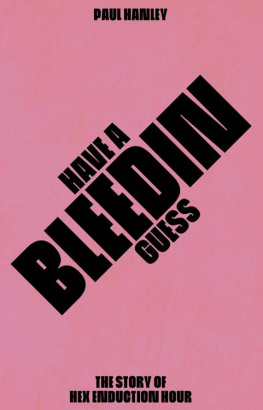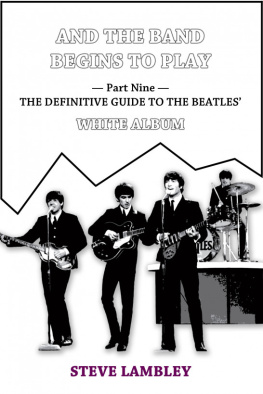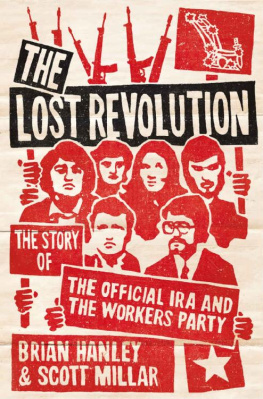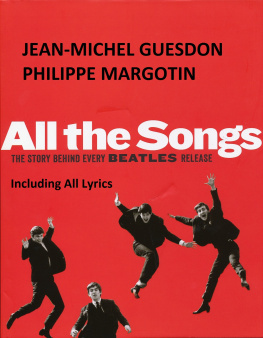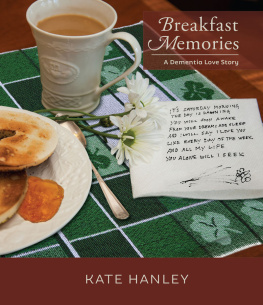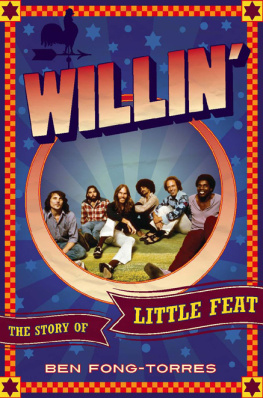HAVE A BLEEDIN GUESS
The Story of Hex Enduction Hour
Paul Hanley
Route
CONTENTS
THE WHOLE EARTH SHUDDERS!
HEX ENDUCTION HOUR UNMASKED!
Foreword by Stewart Lee
HEX REX Etc
PART I: OBLIGATORY COSMOPOLITAN
MUSIC VIEWPOINT
SAXON GAELIC
PART II: HEXEN DEATH BUBBLE
BAWDY LAP-UP BY LEVID U.K. HIRED CAST
BIG P. Hip Priest
Casting Runes Iceland
K.K.AMERA FOGEY LABEL
K.K. BURNS BABE
GINGR ProduceR Smuggler
SUITS OFF, JEANS ON
Keep Shtum The Classical
load o bloody nowt And This Day
DREAM OF Gibbous Synth-men & their BAGS Fortress
ACAD. VEGOS Deer Park
Who is the King Shag Corpse?
POOR-PROCESS Mere Pseud Mag. Ed.
SKRIKKING KIDS
Slogger GelatiNe-Gut HAcks Jawbone and the Air-Rifle
CUSHY E.E.C EURO-STATE GOALS Who Makes The Nazis?
Lung-Wurm back-Rays Just Step Sways
CHUMMY LIFESTYLE Im Into C.B. / Look, Know
RESPECT-INDUCING-HYPHEN Winter
Quality Nazi Pressing!
2nd.-hand old U.S. ideas
HEXEN School
Flabby Wings
PART III: W/M.S. BIG PERSONALITY FACE
Spite does not enter into this
EARND hexen-schule
NOT FIT FOR: HEX END
For Roseanna, Adam and Nathan,
who know all about harmony
THE WHOLE EARTH SHUDDERS!
HEX ENDUCTION HOUR UNMASKED!
In 2002, nearly two decades ago now, I was invited to pitch a proposal for one of the initial half-dozen of the new 33 1/3rd publishers studies of classic albums. I asked if I could write on the record that remains, unquestionably, my favourite of all time, The Falls Hex Enduction Hour , but my suggestion was rejected as too uncommercial.
How could they have resisted the mighty Hex ? I believe it was I who wrote, in April 2019, The Falls fourth album, released in 1982, saw a telepathically tight band, for many the finest frontman Mark E. Smith ever marshalled, mangle the pre-punk outsiders they loved Can, The Velvets, Beefheart and The Stooges into a sound unlike any rock music that preceded it. Two drum kits drove the cheesewire guitars of Craig Scanlon and Marc Riley. Steve Hanleys inch-thick electricity cable basslines simultaneously shaped the songs and shook their foundations. And unlike other singers, Mark E. Smith did not promise to mend my broken heart. Hex offered only an incomprehensible alienation and anger that nascent adolescence recognised. I responded to Hex on a primal level. It bypassed sense, understanding, and conditioning. It still does.
33 1/3rds debutante line-up subsequently emerged, a Hex -free list of Mojo -orthodoxies; Dusty Springfields Dusty In Memphis , Loves Forever Changes , Neil Youngs Harvest , Pink Floyds Piper At The Gates Of Dawn , and The Smiths Meat Is Murder , alongside the then still forgotten The Kinks Are The Village Green Preservation Society , a record from which grumpy enemies of nostalgia could conceivably take some Hex -flavoured comforts.
Today, 140 books down the line, Hex Enduction Hour is still markedly absent from the 33 1/3rd canon (the self-confessed Hexen-schooled Pavement made the grade), though in April 2019 the record deservedly earned a place in Q magazines countdown of the 156 Most Influential Records Of All Time, and I was invited to plead its case to the organs readers.
In retrospect, Im delighted that I never got to write my Hex Enduction Hour book, because now we have Paul Hanleys instead; and its impossible to think of anyone better to have delivered this landmark, and yet deeply personal, analysis of this landmark, and yet deeply problematic, record.
I, a smitten fan who was a psychologically vulnerable thirteen-year-old photocopy of a person when Hex came out, would have gushed my way through a scattershot analysis, riven by an unacknowledged oedipal struggle with the singer, and soiled by the inescapable sense disciples of great records have that the album was in some way written for their benefit, to talk directly to them, to save their insignificant selves. Hex Enduction Hour changed my life!! Without it the world would never have felt the benefit of my magnificent thoughts!!! Get over yself!!!!
Twenty years ago, I went to Reykjavik, to drink in The Caf Iol, as mentioned in the wyrd-folk jam Iceland, and I saw some pipes of aluminium in the Cathedral, and maybe, I suspected, even the entrance to the underpants show; and many a Winters evening have I stood, in dazed wonder, on my way from the railway station and the comedy club, in front of the former Regal Cinema, Hitchin, where the bulk of Hex Enduction Hour was recorded, awaiting some kind of holy revelation in the Hertfordshire half-light. My Hex book would, inevitably, have been all about me, and my heroic efforts to decode the great work. And it would have been shit.
Thank God we have instead the definitive Hex study, written by a man who played on it, lived through it, and who has now amassed both the critical tools, and the critical distance, required to appraise it accurately. Former Fall drummer Paul Hanley joins his brother, former Fall bassist Steve Hanley, as a late blooming literary talent, now able to make the case for Hex s greatness without either the rose-tinted Ray-Bans or the self-righteous rancour that often characterises such revisionist efforts.
Paul has pulled off something of a literary sleight of hand here, balancing the demands of fact-frenzied fans, with the desire to produce a narrative of substance and style. Yes, he offers us the meticulous cataloguing of recording dates of individual songs, locations of sessions, and precise details of equipment where available. But Paul also charts his own path, as a teenager thrown into the deep end on the drum stool of a resolutely non-rock rock band, and tells us tales even obsessives have never heard before. Who knew, for example, that Mere Pseud Mag. Ed. owes a musical debt to Baby Sitters, the one-off 1979 single by the eleven-year-old Adamskis infant-punk duo Stupid Babies? I didnt know that. And I know everything.
And just as God is in the details, so Paul Hanley is in the footnotes. For me, the footnote is a massively underrated literary device, and it is my aim to one day produce a book which is mainly comprised of footnotes at the expense of the main narrative itself. Paul is a modern master of the footnote, and switches tone from a more detached and objective mode in the text proper, to a gossipy and sometimes indiscreet mode below the line, letting slip with good-humoured indulgence the sort of dynamite trivia fans love, satiating our needy hunger and our pathetic longing.
In the main text, Paul is reading aloud at a lectern at a book festival in a severe-looking publicly-funded building. In the footnotes, youve cornered him afterwards, in the Wetherspoons across the road, and hes spilling his secrets all over one of Tim Martins bespoke regional carpet designs.
Above all, one takes away from Have A Bleedin Guess the sense that Paul Hanley is, to quote the catchphrase of Robert Lloyd of the Nightingales (who, we learn, sold Marc Riley a guitar with a strap signed by Link Wray) a good bloke. Musicians memoirs can tend to fixate on the settling of scores, the avoidance of blame, and the righting of imagined wrongs. The Falls figurehead Mark E. Smith left chaos and anger in his wake, but though Paul sets a few facts about songwriting credits straight, the Hexen hour is long enough ago now for him to weigh equally and fairly the strengths and weaknesses of the tense personal dynamics that made that classic Fall line-up function as it did. In short, theres a generosity of spirit in Have A Bleedin Guess that is often absent from rock musicians recollections of their time in the field.
Next page
